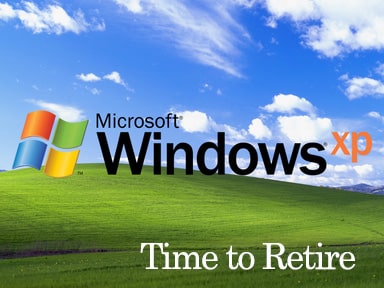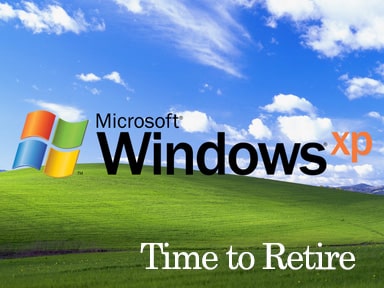
Here are some things you should consider if you still have a Windows XP workstation or laptop:
Security and Compliance Issues
No more updates for your operating system may be relief to those who dislike those testy reminders and the downtime involved with these changes. However, the reality is without them, your system is more vulnerable to hacking and malware. Newer platforms such as Windows 7 and 8 are inherently much more secure. Microsoft continues to plug security holes as hackers uncover them with these operating systems, so that users have stronger protection.
If your computer has no connectivity, security may not be a big issue. However, if you are connected to the Internet, you will be at risk. If your Windows XP computer is part of a network, it poses a security threat to the entire network.
End of Support for Windows XP also presents larger issues for businesses in specific industries driven by compliance requirements such as PCI or HIPAA. Without current support, organizations with Windows XP computers may fail to pass audits or be fined by their regulatory bodies.
Over Time, Less Access to Applications
Most developers create their applications to work on the most popular platforms. To keep attracting new clients and placate existing customers, developers need to take advantage of advances of these newer operating systems. Over time, inevitably fewer applications will run on Windows XP, even in compatibility mode. This will limit your access to new versions, features, or fixes for your existing applications. Additionally, you may not be able to find new applications that run on this platform.
What to Do Next
You could continue to run your system for quite some time with Windows XP. It won’t suddenly freeze up and refuse to work, but that doesn’t mean that you will never run in to a system issue. When you do, it may be harder to find support from third parties willing to work with this platform.
So, what are your options? You could try to upgrade the operating system on your computer. However, this is likely to pose issues. An older computer doesn’t have the components and speed needed to run a newer OS. So, performance of your system would most likely suffer.
Your best bet is to invest in a new computer with Windows 7, which offers the best combination of ease of use, performance, and built-in security. Most business software is developed for the Windows 7 interface, and Microsoft has committed to providing support for this version through 2020. While Windows 8 may seem exciting and flashy, it is too new and limited in real-world use to currently be recommended by many business technology providers. It is better to think of Windows 8 as an upgrade option down the road.
Once you make the leap to a new device, you will be amazed at the increased speed and improved capabilities it offers. And, you will also be able to rest assured that you are more secure.
For a quote for replacement workstation and laptops for your business, contact us.


